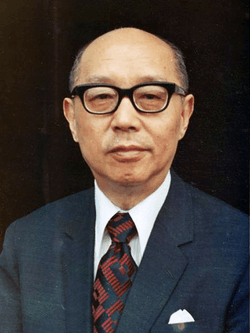Yen Chia-kan
Yen Chia-kan (Chinese: 嚴家淦; pinyin: Yán Jiāgàn; Wade–Giles: Yen2 Chia1-kan4; 23 October 1905 – 24 December 1993), also known as C. K. Yen, was a Kuomintang politician. He succeeded Chiang Kai-shek as President of the Republic of China on 5 April 1975,[1], being sworn in on 6 April 1975,[2] and served out the remainder of Chiang's term until 20 May 1978.
C. K. Yen Yen Chia-kan | |||||||||||||||||||||||||||||||||||||||
|---|---|---|---|---|---|---|---|---|---|---|---|---|---|---|---|---|---|---|---|---|---|---|---|---|---|---|---|---|---|---|---|---|---|---|---|---|---|---|---|
嚴家淦 | |||||||||||||||||||||||||||||||||||||||
 | |||||||||||||||||||||||||||||||||||||||
| President of the Republic of China | |||||||||||||||||||||||||||||||||||||||
| In office 5 April 1975 – 20 May 1978 | |||||||||||||||||||||||||||||||||||||||
| Vice President | None | ||||||||||||||||||||||||||||||||||||||
| Preceded by | Chiang Kai-shek | ||||||||||||||||||||||||||||||||||||||
| Succeeded by | Chiang Ching-kuo | ||||||||||||||||||||||||||||||||||||||
| Vice President of the Republic of China | |||||||||||||||||||||||||||||||||||||||
| In office 20 May 1966 – 5 April 1975 | |||||||||||||||||||||||||||||||||||||||
| President | Chiang Kai-shek | ||||||||||||||||||||||||||||||||||||||
| Preceded by | Chen Cheng | ||||||||||||||||||||||||||||||||||||||
| Succeeded by | Hsieh Tung-min | ||||||||||||||||||||||||||||||||||||||
| Premier of the Republic of China | |||||||||||||||||||||||||||||||||||||||
| In office 16 December 1963 – 29 May 1972 | |||||||||||||||||||||||||||||||||||||||
| President | Chiang Kai-shek | ||||||||||||||||||||||||||||||||||||||
| Vice Premier | Yu Ching-tang Huang Shao-ku Chiang Ching-kuo | ||||||||||||||||||||||||||||||||||||||
| Preceded by | Chen Cheng | ||||||||||||||||||||||||||||||||||||||
| Succeeded by | Chiang Ching-kuo | ||||||||||||||||||||||||||||||||||||||
| |||||||||||||||||||||||||||||||||||||||
| Personal details | |||||||||||||||||||||||||||||||||||||||
| Born | 23 October 1905 Suzhou, Jiangsu, Qing Dynasty | ||||||||||||||||||||||||||||||||||||||
| Died | 24 December 1993 (aged 88) Taipei, Taiwan | ||||||||||||||||||||||||||||||||||||||
| Resting place | Wuzhi Mountain Military Cemetery | ||||||||||||||||||||||||||||||||||||||
| Nationality | Republic of China | ||||||||||||||||||||||||||||||||||||||
| Political party | Kuomintang | ||||||||||||||||||||||||||||||||||||||
| Spouse(s) | Liu Chi-chun | ||||||||||||||||||||||||||||||||||||||
| Yen Chia-kan | |||||||||||||||||
|---|---|---|---|---|---|---|---|---|---|---|---|---|---|---|---|---|---|
| Traditional Chinese | 嚴家淦 | ||||||||||||||||
| Simplified Chinese | 严家淦 | ||||||||||||||||
| |||||||||||||||||
Early life
He was born in Wu County, Suzhou, Jiangsu province in 1905. He came of a prestigious Suzhou family, the Yan (Yen) Family of Dongshan (東山嚴氏).[3] He graduated from Saint John's University in Shanghai with a degree in chemistry in 1926.
Political career
In 1931, Yen began serving as a manager of the Shanghai railway administration.[4] Yen started to work as director of the finance department of Fujian Provincial Government in August 1939. During his term, he initiated a policy of land tax payment for farmers with their agricultural produce. This policy was then adopted nationwide across China and contributed significantly for the nation food supply during World War II.[5]
Yen previously served as Minister of Economic Affairs, minister of finance, and Governor of Taiwan Province. He became premier on 16 December 1963.[6][7]
In 1966 the National Assembly elected Yen as Vice President and re-elected him in 1972. On the afternoon of January 5, 1973, Yen visited Washington, D.C. and met with US President Richard Nixon.[8] Yen became the second President following the death of Chiang Kai-shek and was later succeeded by Chiang's son, Premier Chiang Ching-kuo. After his presidency, Yen served as chairman of the Council on Chinese Cultural Renaissance and chairman of the board of the National Palace Museum until 1991.
Death
Yen died in Taipei City at the age of 88. He was buried at the Wuchih Mountain Military Cemetery in New Taipei City.
See also
| Wikimedia Commons has media related to Yen Chia-kan. |
References
- 第5任 嚴總統家淦先生. 中華民國總統府 Office of the President Republic of China (Taiwan) (in Chinese). Retrieved 29 September 2019.
64年04月05日 蔣中正總統逝世,依憲法規定繼任第五任總統。
- "Chiang Kai-shek (1st - 5th terms)". Office of the President Republic of China (Taiwan). Retrieved 29 September 2019.
1975-04-06 Sworn in as President in accordance with Constitution upon death of President Chiang Kai-shek.
- By Sun Zhongwang, "Yan Family, Dongting Dongshan Anrenli (孙中旺,《洞庭東山安仁里严氏》) Archived 2010-02-21 at the Wayback Machine The Office of Suzhou History (苏州地方志). Yan Jiachi, an important politician in the Reformed Government of the Republic of China and the Wang Jingwei regime (Republic of China-Nanjing) also came of this family.
- Han Cheung (31 March 2019). "Taiwan in Time: The (often) forgotten president". Taipei Times. Retrieved 31 March 2019.
- http://english.president.gov.tw/Default.aspx?tabid=550
- "Yen Chia-kan", in Heads of States and Governments Since 1945, by Harris M. Lentz, (Routledge, 2014) p173
- "Yen Assumes Premiership", Bridgeport (CT) Post, December 16, 1963, p10
- David P. Nickles, ed. (2007). Memorandum of Conversation. Foreign Relations of the United States, 1969–1976. 18 – via Office of the Historian.
| Political offices | ||
|---|---|---|
| Preceded by Liu Hang-chen |
Economic Affairs Minister of the Republic of China 1950 |
Succeeded by Cheng Tao-ju |
| Preceded by Kuan Chi-yu |
Finance Minister of the Republic of China 1950–1954 |
Succeeded by P. Y. Shu |
| Preceded by position established |
Minister of Vocational Assistance Commission for Retired Servicemen of the Republic of China 1954–1956 |
Succeeded by Chiang Ching-kuo |
| Preceded by Yu Horng-jiun |
Governor of Taiwan Province 1954–1957 |
Succeeded by Chow Chih-jou |
| Preceded by P. Y. Shu |
Finance Minister of the Republic of China 1958–1963 |
Succeeded by Chen Ching-yu |
| Preceded by Chen Cheng |
Premier of the Republic of China 1963–1972 |
Succeeded by Chiang Ching-kuo |
| Preceded by Chen Cheng |
Vice President of the Republic of China 1966–1975 |
Succeeded by Hsieh Tung-ming |
| Preceded by Chiang Kai-shek |
President of the Republic of China April 5, 1975–May 20, 1978 |
Succeeded by Chiang Ching-kuo |